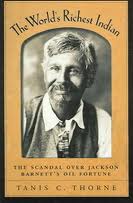 Indians who couldn’t speak English were easy targets for whites who wanted their assets. A bit of mental deficiency only made it easier. Jackson Barnett was a retarded Indian in Oklahoma who received a randomly selected allotment (160 acres) around the turn of the 20th century. When oil was discovered on the land, the Indian Office appointed a guardian for him; the guardian very properly leased Barnett’s land for him and paid the oil royalties to the superintendent of the Five Civilized Tribes at Muskogee, Oklahoma.
Indians who couldn’t speak English were easy targets for whites who wanted their assets. A bit of mental deficiency only made it easier. Jackson Barnett was a retarded Indian in Oklahoma who received a randomly selected allotment (160 acres) around the turn of the 20th century. When oil was discovered on the land, the Indian Office appointed a guardian for him; the guardian very properly leased Barnett’s land for him and paid the oil royalties to the superintendent of the Five Civilized Tribes at Muskogee, Oklahoma.
Jackson was eventually worth over a million dollars, and in 1920, a white woman suddenly showed up on his doorstep and persuaded him to get into her car. She drove Barnett to Kansas and married him (against Kansas law), then drove to Missouri and married him again. She eventually got him to sign over half his money to a mission society, and half to her.
This woman and others concerned with Barnett’s estate met with Commissioner of Indian Affairs, Charles Burke, who gave his approval for their actions. Publicity eventually upset the wife’s plans and the courts threw out the contracts Barnett had signed. Burke was criticized for his actions, but he was exonerated of wrong-doing by the House subcommittee which investigated the case.
______________________________________________________________________________________








Feeble-minded was another term in use at the time, and it’s a word that for some reason I simply don’t like using. As I replied earlier, I don’t strive to be politically correct when discussing things from another era. Another issue of importance from the first comment was that Barnett was not necessarily considered “retarded” by his tribe. Native Americans did not typically view people in cookie-cutter ways that made people with certain traits less valuable than others. Tribal members could contribute to the common good in many ways, and not all of them were necessarily intellectual. Members with what the modern day would consider mental problems weren’t considered flawed at all; it’s unfortunate that this embracing cultural attitude has shifted in the way it has.
I believe the author wrote this, and used the wording from original documents. Political correctness didn’t start consuming us until many years later than this event. It is certain that “mentally challenged” weren’t words that people would have thought to use instead of “retarded.”
I think that “mentally challenged” or a similar description has replaced “retarded” to a great extent. I do try to keep my words within those commonly used at the time, so I am politically incorrect quite often. And, of course, you are right that it was not proper in any larger sense for Barnett’s guardian to lease his land for him; I simply meant that since there was going to be interference from paternalistic whites, this person at least looked out for Barnett’s interests. So many other whites stole assets outright or leased land for pittances, that Barnett’s wealth was refreshingly proper. It can be difficult to get all these nuances into a blog, certainly.
I do so appreciate your interest in my topic. In researching my book and working on this blog, I’ve learned so much, myself. Paternalism seems, to me, an especially heavy-handed policy that did little to nothing to help the people purportedly “in need” of federal care.
Thank-you for this important blog! A couple of quick comments…
Is “retarded” a word that’s still used? I actually don’t know, but I haven’t heard that word in a long time.
I’m a Native PhD student and I’ve researched Jackson Barnett quite a bit. The leasing of his lands wasn’t in any way “proper,” but it was commonly done to Indian people of all IQ levels. I have seen BIA files where the agent measured the length of people’s arms and the circumference of their skulls to determine if they were too “simian” to be allowed to manage their money, land, and other assets–or if the (often crooked) local Indian agent should take over their affairs. My research indicates a characterization of “common” is more accurate than “proper.” Anyway, something to consider.
Jackson was also quite gifted in ways important to his tribe. The scholarship and other info out there doesn’t emphasize this as much as it should…still so much work to be done. Miigwetch/Thank-you again for this blog!! It’s so important, and I’ve learned a lot from it.